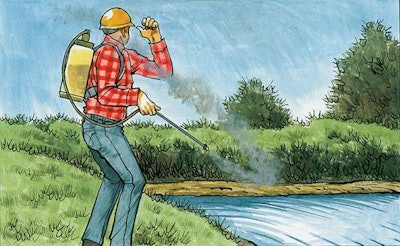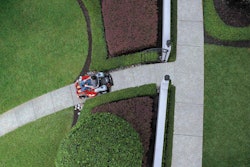

The accident: A crewmember is applying pesticides on a commercial property using a backpack sprayer. It’s a particularly windy day, and as he is spraying a section of the lawn, a wind gust picks up and blows the chemicals onto the worker. The pesticide gets on his hands, face and in his eyes. It causes his skin to be irritated and his eyes to burn and swell for several days.
The bottom line: Getting pesticides or other chemicals on your skin can cause mild to severe dermatitis. The employee should have worn the proper personal protective equipment (PPE) and avoided spraying when it was so windy.
Not only can pesticide drift result in injury, it can also cause off-target areas – such as water features and plants – to be sprayed.
Here are precautions employees should take when working with chemicals:
- Check the wind speed and direction to make sure they are both within the recommendations on the pesticide label.
- Wash your hands and face before eating or drinking, and shower after work.
- If using a truck equipped with a tank, pump and hose to apply chemicals, don’t park it near water or storm drains. The vehicle should also carry a spill kit.
- Wear PPE and the proper clothing: gloves, eye protection, long sleeves, long pants and closed-toe shoes.
- Read the chemical’s label to understand how to mix, apply and store the pesticide. The label will also tell what type of PPE is required.
- If pesticides are sprayed or spilled on your body, wash immediately with clean water.
- Owners should educate employees on spray drift management.
- Keep the spray nozzle as close to the target area as possible.
Read more Safety Watch articles.









